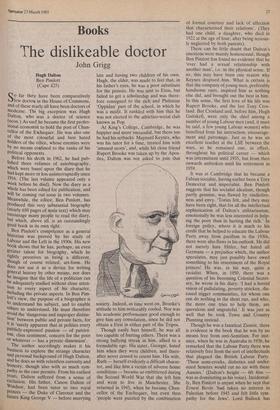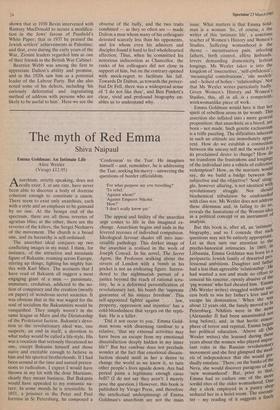Books
The dislikeable doctor
John Grigg
Hugh Dalton Ben Pimlott (Cape £25) Q o far there have been comparatively L./ few doctors in the House of Commons, and of these nearly all have been doctors of medicine. The big exception was Hugh Dalton, who was a doctor of science (econ.) As slid' he became the first profes- sional economist to hold the post of Chan- cellor of the Exchequer. He was also one of the most colourful and best hated holders of the office, whose enemies were by no means confined to the ranks of his Political opponents. Before his death in 1962, he had pub- lished three volumes of autobiography, which were based upon the diary that he had kept more or less uninterruptedly since 1916. (The last volume appeared only a week before he died). Now the diary as a whole has been edited for publication, and will be coming out soon in two volumes. Meanwhile, the editor, Ben Pimlott, has produced this very substantial biography (nearly 650 pages of main text) which may encourage many people to read the diary, but which, above all, is an outstandingly good book in its own right. Ben Pimlott's competence as a general historian was proved by his study of Labour and the Left in the 1930s. His new book shows that he has, perhaps, an even greater talent for biography, which he rightly perceives as being a different, though of course related, art-form. He does not use it as a device for writing general history by other means, nor does be imagine that the life of a politician can 0e adequately studied without close atten- tion to every aspect of his character, including the private aspects. In Ben Pim- lott's view, the purpose of a biographer is to understand his subject, and to enable ethers to understand. He must therefore avoid the 'dangerous and improper distinc- tion' between public and private facts, for it is 'surely apparent that in politics every publicly-expressed passion — of patriot- ism, class sentiment, concern for the poor or whatever — has a private dimension'. The author acccrdingly makes it his business to explore the strange character and personal background of Hugh Dalton, and he does so with relentless curiosity and honesty, though also with as much sym- pathy as the case permits. From his earliest Years, Dalton suffered from a sense of exclusion. His father, Canon Dalton of Windsor, had been tutor to two royal princes — the Duke of Clarence and the future King George V — before marrying late and having two children of his own. Hugh, the elder, was made to feel that, in his father's eyes, he was a poor substitute for the princes. He was sent to Eton, but failed to get a scholarship and was there- fore consigned to the rich and Philistine `Oppidan' part of the school, in which he was a misfit. It rankled with him that he was not elected to the athletico-social club known as Pop. At King's College, Cambridge, he was happier and more successful, but there too he had his setbacks. Maynard Keynes, who was his tutor for a time, treated him with 'amused scorn', and, while his close friend Rupert Brooke was taken up by the Apos- tles, Dalton was not asked to join that society. Indeed, as time went on, Brooke's attitude to him noticeably cooled. Nor was his academic performance good enough to give him any consolation, since he did not obtain a First in either part of the Tripos.
Though easily hurt himself, he was all too capable of hurting others. There was a strong bullying streak in him, allied to a formidable ego. His sister, Georgie, hated him when they were children, and there- after never ceased to resent him. His wife, Ruth — herself evidently a difficult charac- ter, and like him a victim of adverse home conditions — became so embittered during the Second World War that she left him and went to live in Manchester. She returned in 1945, when he became Chan- cellor of the Exchequer, but even then `people were puzzled by the combination of formal courtesy and lack of affection that characterised their relations'. (They had one child, a daughter, who died in 1922 at the age of four, after being serious- ly neglected by both parents).
There can be little doubt that Dalton's emotions were mainly homosexual, though Ben Pimlott has found no evidence that he 'ever had a sexual relationship with another man', i.e. in the physical sense. If so, this may have been one reason why Keynes despised him. What is certain is that the company of young men, preferably handsome ones, inspired him as nothing else did, and brought out the best in him. In this sense, the first love of his life was Rupert Brooke, and the last Tony Cros- land. But Crosland and, before him, Hugh Gaitskell, were only the chief among a number of young Labour men (and, it must be said, a few young Labour women) who benefited from his instruction, encourage- ment and patronage. Just as he was an excellent teacher at the LSE between the wars, so he remained one, in effect, throughout his political career — which was intermittent until 1935, but from then onwards unbroken until his retirement in 1959.
It was at Cambridge that he became a Fabian socialist, having earlier been a Tory Democrat and imperialist. Ben Pimlott suggests that his socialist idealism, though partly genuine, was flawed by vindictive- ness and envy. 'Tories felt, and they may have been right, that for all the intellectual sophistication of Dalton's utilitarianism, emotionally he was less interested in help- ing the poor than in hurting the rich.' In foreign policy, where it is much to his credit that he helped to educate the Labour Party away from pacifism in the 1930s, there were also flaws in his outlook. He did not merely hate Hitler, but hated all Germans — a prejudice which, the author speculates, may just possibly have owed something to his resentment of the Royal princes! He was, in his way, quite a racialist. When, in 1950, there was a question of his becoming Colonial Secret- ary, he wrote in his diary: 'I had a horrid vision of pullulating, poverty stricken, dis- eased nigger communities, for whom one can do nothing in the short run, and who, the more one tries to help them, are querulous and ungrateful.' It was just as well that he took Town and Country Planning instead.
Though he was a fanatical Zionist, there is evidence in the book that he was by no means free from anti-Semitism. For inst- ance, when he was in Australia in 1938, he remarked that the Labour Party there was relatively free from the sort of intellectuals that plagued the British Labour Party.
`These semi-crocks, diabetics and under- sized Semites would cut no ice with these Aussies.' (Dalton's height — 6ft 4ins - was as dominating as his voice). Incidental- ly, Ben Pimlott is unjust when he says that Ernest Bevin tad taken no interest in Palestine before 1945 and felt little sym- pathy for the Jews'. Lord Bullock has shown that in 1930 Bevin intervened with Ramsay MacDonald to secure a modifica- tion in the Jews' favour of Passfield's White Paper; that in 1937 he praised the Jewish settlers' achievements in Palestine; and that, even during the early years of the War, Zionist leaders regarded him as one of their friends in the British War Cabinet.
Beatrice Webb was among the first to appreciate Dalton's ability and promise, and in the 1920s saw him as a potential leader of the Labour Party. But she also noted some of his defects, including 'his curiously deferential and ingratiating method of address with persons who are likely to be useful to him'. Here we see the obverse of the bully, and the two traits combined — as they so often are — made Dalton a man whom many of his colleagues detested scarcely less than his opponents, and for whom even his admirers and disciples found it hard to feel wholehearted affection. Thus, when he committed his notorious indiscretion as Chancellor, the ranks of his colleagues did not close in support of him, but on the contrary opened with mock-regret to facilitate his fall. Towards Dr Dalton, as towards the prover- bial Dr Fell, there was a widespread sense of 'I do not like thee', and Ben Pimlott's clear, vivid and profound biography en- ables us to understand why.















































 Previous page
Previous page